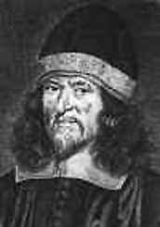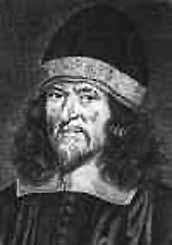
Thomas Goodwin
Encyclopedia

England
England is a country that is part of the United Kingdom. It shares land borders with Scotland to the north and Wales to the west; the Irish Sea is to the north west, the Celtic Sea to the south west, with the North Sea to the east and the English Channel to the south separating it from continental...
Puritan
Puritan
The Puritans were a significant grouping of English Protestants in the 16th and 17th centuries. Puritanism in this sense was founded by some Marian exiles from the clergy shortly after the accession of Elizabeth I of England in 1558, as an activist movement within the Church of England...
theologian and preacher, and an important leader of religious Independents. He served as chaplain to Oliver Cromwell
Oliver Cromwell
Oliver Cromwell was an English military and political leader who overthrew the English monarchy and temporarily turned England into a republican Commonwealth, and served as Lord Protector of England, Scotland, and Ireland....
, and was imposed by Parliament as President of Magdalen College, Oxford
Magdalen College, Oxford
Magdalen College is one of the constituent colleges of the University of Oxford in England. As of 2006 the college had an estimated financial endowment of £153 million. Magdalen is currently top of the Norrington Table after over half of its 2010 finalists received first-class degrees, a record...
in 1650. Christopher Hill places Goodwin in the ‘main stream of Puritan thought’.
Early life
He studied at Cambridge from August 1613. He was an undergraduate of Christ's College, CambridgeChrist's College, Cambridge
Christ's College is a constituent college of the University of Cambridge.With a reputation for high academic standards, Christ's College averaged top place in the Tompkins Table from 1980-2000 . In 2011, Christ's was placed sixth.-College history:...
, graduating with a B.A. in 1616.
In 1619 he removed to Catharine Hall, where in 1620 he was elected fellow. In 1625 he was licensed a preacher of the university; and three years afterwards he became lecturer of Trinity Church, successor to John Preston, to the vicarage of which he was presented by the king in 1632.
Dissenter
Worried by his bishop, who was a zealous adherent of William LaudWilliam Laud
William Laud was Archbishop of Canterbury from 1633 to 1645. One of the High Church Caroline divines, he opposed radical forms of Puritanism...
, he resigned all his preferments and left the university in 1634; he became a Congregationalist
Congregational church
Congregational churches are Protestant Christian churches practicing Congregationalist church governance, in which each congregation independently and autonomously runs its own affairs....
. He lived for some time in London, where 1638 he married the daughter of an alderman
Alderman
An alderman is a member of a municipal assembly or council in many jurisdictions founded upon English law. The term may be titular, denoting a high-ranking member of a borough or county council, a council member chosen by the elected members themselves rather than by popular vote, or a council...
. In 1639 he fled to Holland to escape persecution. For some time was pastor of a small congregation of English merchants and refugees at Arnheim
Arnheim
Arnheim may refer to:* Edith Arnheim , Swedish tennis player* Fritz Arnheim , German historian* Gus Arnheim , American band leader* Rudolf Arnheim , German American author...
. He returned shortly after the inception of the Long Parliament
Long Parliament
The Long Parliament was made on 3 November 1640, following the Bishops' Wars. It received its name from the fact that through an Act of Parliament, it could only be dissolved with the agreement of the members, and those members did not agree to its dissolution until after the English Civil War and...
.
He ministered for some years to the Independent congregation meeting at Paved Alley Church, Lime Street
Lime Street
Lime Street is an American action/drama series that aired on the ABC television network during the 1985 television season. The series was created by Linda Bloodworth-Thomason, who also served as executive producer alongside husband Harry Thomason and series star Robert Wagner.-Synopsis:The cast of...
, in the parish of St Dunstans-in-the-East, and rapidly rose to considerable eminence as a preacher.
Puritan leader
In 1643 he was chosen a member of the Westminster AssemblyWestminster Assembly
The Westminster Assembly of Divines was appointed by the Long Parliament to restructure the Church of England. It also included representatives of religious leaders from Scotland...
, and at once identified himself with the Independent
Independent (religion)
In English church history, Independents advocated local congregational control of religious and church matters, without any wider geographical hierarchy, either ecclesiastical or political...
party, generally referred to in contemporary documents as the "dissenting brethren." He frequently preached by appointment before the Commons, and in January 1650 his talents and learning were rewarded by the House with the presidentship of Magdalen College, Oxford, a post which he held until the Restoration of 1660.
He was chaplain to Oliver Cromwell from 1656. He rose into high favour with the Protector, and was one of his intimate advisers, attending him on his death-bed.
He was also a commissioner for the inventory of the Westminster Assembly, 1650, and for the approbation of preachers, 1653, and together with John Owen
John Owen (theologian)
John Owen was an English Nonconformist church leader, theologian, and academic administrator at the University of Oxford.-Early life:...
drew up an amended Westminster Confession in 1658.
From 1660 until his death, he lived in London, and devoted himself exclusively to theological study and to the pastoral charge of the Fetter Lane Independent Church.
Works
The works published by Goodwin during his lifetime consist chiefly of sermons printed by order of the House of Commons. He was also associated with Philip NyePhilip Nye
Philip Nye was a leading English Independent theologian.-Life:He graduated with an M.A. from Magdalen Hall, Oxford in 1622. He spent the years 1633 to 1640 in exile, in Holland.....
and others in the preparation of the Apologeticall Narration (1643).
Five volumes of his sermons and other works were published from 1682 to 1704. They have been reprinted at least 47 times. His collected writings, which include expositions of the Epistle to the Ephesians
Epistle to the Ephesians
The Epistle of Paul to the Ephesians, often shortened to Ephesians, is the tenth book of the New Testament. Its authorship has traditionally been credited to Paul, but it is considered by some scholars to be "deutero-Pauline," that is, written in Paul's name by a later author strongly influenced by...
and of the Apocalypse
Apocalypse
An Apocalypse is a disclosure of something hidden from the majority of mankind in an era dominated by falsehood and misconception, i.e. the veil to be lifted. The Apocalypse of John is the Book of Revelation, the last book of the New Testament...
, were published in five folio volumes between 1681 and 1704, and were reprinted in twelve 8vo volumes (Edin., 1861–1866).
They are characterized by abundant yet one-sided reading, depth with narrowness of their observation and spiritual experience, they are thorough but prolix. They fairly exemplify both the merits and the defects of the special school of religious thought to which they belong. Edmund Calamy the Elder
Edmund Calamy the Elder
Edmund Calamy was an English Presbyterian church leader and divine. Known as "the elder", he was the first of four generations of nonconformist ministers bearing the same name.-Early life:...
's estimate of Goodwin's qualities may be quoted as both friendly and just. He was a considerable scholar and an eminent divine, and had a very happy faculty in descanting upon Scripture so as to bring forth surprising remarks, which yet generally tended to illustration.
A memoir, derived from his own papers, by his son (Thomas Goodwin the younger, 1650?-1716?, Independent, minister at London and Pinner, and author of the History of the Reign of Henry V) is prefixed to the fifth volume of his collected works; as a patriarch and Atlas of Independency he is also noticed by Anthony Wood
Anthony Wood
Anthony Wood or Anthony à Wood was an English antiquary.-Early life:Anthony Wood was the fourth son of Thomas Wood , BCL of Oxford, where Anthony was born...
in the Athenae Oxonienses.
An amusing sketch, from Joseph Addison
Joseph Addison
Joseph Addison was an English essayist, poet, playwright and politician. He was a man of letters, eldest son of Lancelot Addison...
's point of view, of the austere and somewhat fanatical president of Magdalen, is preserved in No. 494 of The Spectator
The Spectator
The Spectator is a weekly British magazine first published on 6 July 1828. It is currently owned by David and Frederick Barclay, who also owns The Daily Telegraph. Its principal subject areas are politics and culture...
.

